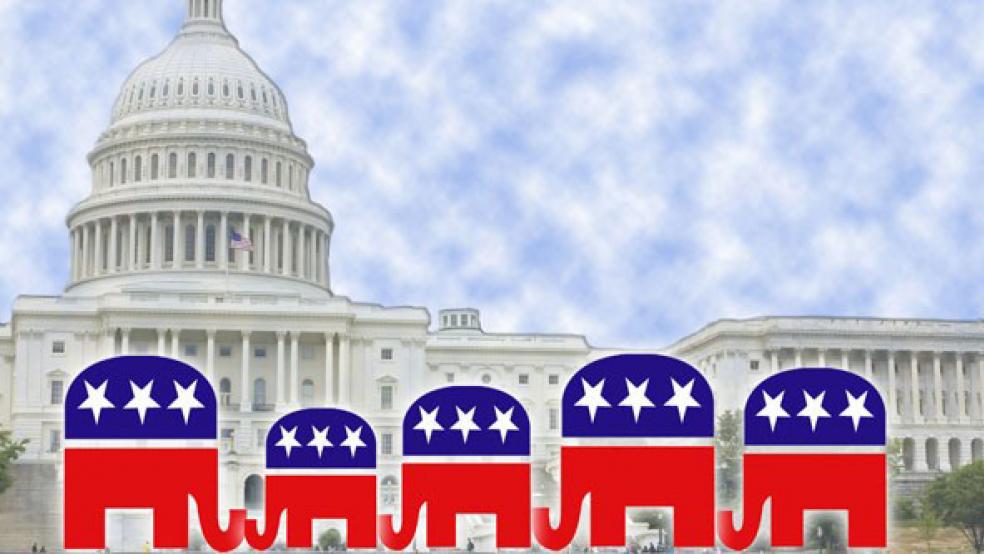House Republicans are signaling that they won’t use a government shutdown to wring concessions out of Democrats this fall.
Instead, they’ll pass a continuing resolution so that D.C. can operate for a few more months. Then GOP lawmakers will try to leverage the need to raise the $16.7 trillion debt ceiling to extract their desired cuts to Obamacare and government spending.
The plan was outlined by the National Review and the Washington Examiner. It also jibes with what many House members are telling their constituents during August recess. Plus, it matches up with statements by House Majority Leader Eric Cantor (R-VA) and Senate Minority Leader Mitch McConnell (R-KY).
“No one is advocating a government shutdown,” Cantor told the National Review.
Yet some Republicans are at least coming close. Sens. Ted Cruz (R-TX), Marco Rubio (R-FL) and Mike Lee (R-UT) have touted a plan that threatens to shut down the government as of October 1, the beginning of fiscal 2014, unless Obamacare is defunded.
RELATED: GOVERNMENT SHUTDOWN LOOMS OVER FUNDING OBAMACARE
Cantor’s comments suggest that the GOP leadership opposes this strategy and favors delaying the debate. But other than pushing a showdown back a few pages on the calendar, what difference would that make?
<iframe src="https://admin.thefiscaltimes.com/%3Ca%20href%3D"http://embed.newsinc.com/Single/iframe.html?WID=2&VID=25030069&freewheel=91214&sitesection=fiscaltimes&height=309&width=550">http://embed.newsinc.com/Single/iframe.html?WID=2&VID=25030069&freewheel=91214&sitesection=fiscaltimes&height=309&width=550" height=309 width=550 frameborder=no scrolling=no noresize marginwidth=0px marginheight=0px></iframe>
For much of the country, the budgetary stakes basically stay the same … or, with a potential default on federal debt in the balance, they get upped to the absurd levels of the final, Earth-shaking battle in a Marvel Comics film.
For Republicans, the stakes would certainly get higher. Neither shutdown scenario would seem to make the party more likable to independent and swing voters, let alone to some of the frustrated GOP faithful who endorse compromising. This definitely helps a vocal base of conservative supporters, but not necessarily anyone else. And if Republicans don’t win elections, they will likely remain—to use House Speaker John Boehner’s words—a “minority” party.
Here’s why the debt ceiling is essentially the same thing—or possibly worse—than the shutdown that GOP leadership is determined to avoid. The Congressional Budget Office estimates that the deficit will be $560 billion next fiscal year. Another $400 billion in debt from the fiscal 2013 deficit has been pushed off by the Treasury Department through the use of “extraordinary measures.” Those measures get exhausted at some point in November. Without the authority to borrow more to cover those additional debts, the government would largely stop operating.
The Republican solution has been to prioritize Social Security payments and debt service to avoid an official default. This assumes that bond markets will see the approach as a rational negotiating strategy, and that investors won’t freak out in a way that causes interest rates to spike. The GOP could relieve the pressure with piecemeal increases to the debt ceiling, basically turning the gridlock and repeated crises into formal government policy while the economy lurches along.
RELATED: A REPUBLICAN WHO COULD ACTUALLY WIN THE PRESIDENCY
Maybe Obama decides to cut a deal, or maybe he stands his ground. The White House isn’t really telegraphing its breaking point yet. At best, Republicans could delay parts of Obamacare by another year and win bragging points with some spending reforms.
But Obama still gets to characterize Republicans as villains, at least as defined by pop culture critic Chuck Klosterman’s new book, “I Wear the Black Hat.” A true Machiavellian villain, Klosterman writes, is someone who knows the most, but cares the least. Emphasis on the word “care.”
Obama is already describing Republicans in those terms. “I can tell you that the American people would have difficulty understanding why we would weaken our economy, shut down our government, shut down vital services, have people who are not getting paid who then can't go to restaurants or shop for clothes, or all the other things that we’re doing here because Republicans have determined that they don't want to see these folks get health care,” Obama said at his press conference last Friday.
Comic book variety villains often try to justify their actions with the argument that they are being done for the greater good. Some conservatives, both in D.C. and at the grassroots, have argued that a shutdown threat may be their last, best shot to derail Obamacare for the good of the country. But that argument would be extremely tough to make if the economy hurtles toward disaster.
Klosterman specifically identifies former House Republican Speaker Newt Gingrich as the epitome of a loathsome villain among would-be presidential candidates last year. But at a Republican National Committee meeting in Boston on Wednesday, it was Gingrich calling on his party to be less negative, to offer constructive alternatives to Obamacare instead of demolition plans.
Newt—who actually did shut down the government in 1995 and 1996—sees the current strategy as self-destructive.
“We are caught up right now in a culture, and you see it every single day, where as long as we are negative and as long as we are vicious and as long as we can tear down our opponent, we don’t have to learn anything,” he said, according to CNN.




